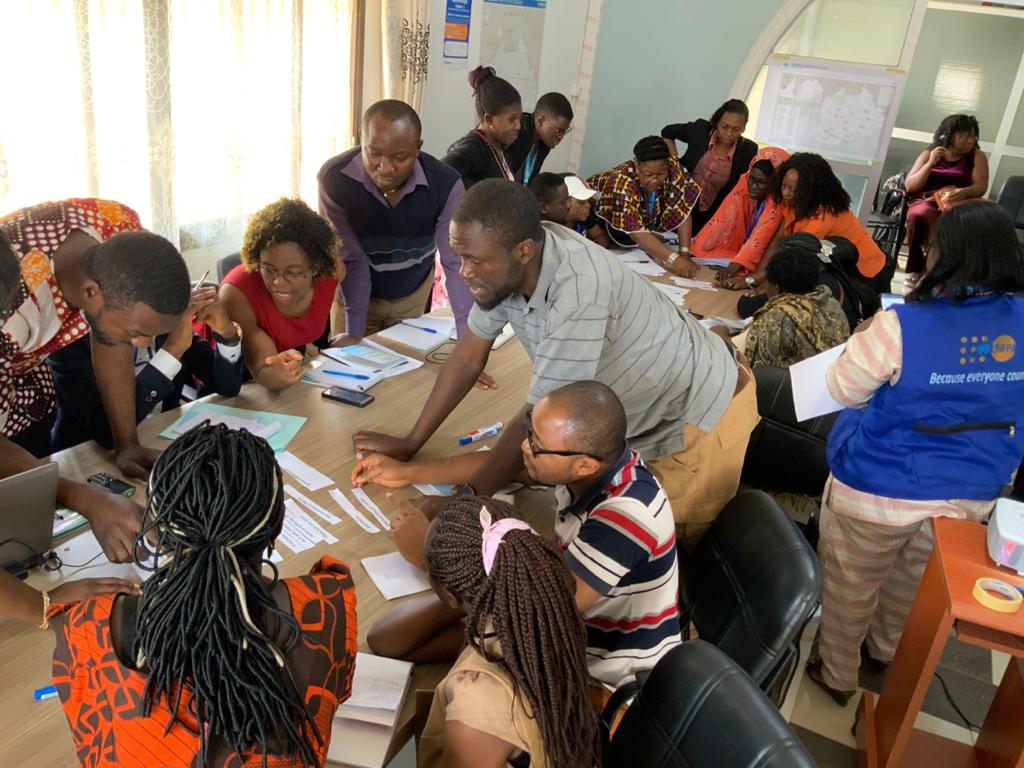According to UN 2019 Humanitarian Response Plan for Cameroon, around 4.3 million people need urgent assistance. Displacement has risen by 82 per cent compared with 2018. Renewed armed attacks have driven tens of thousands more Nigerians into Cameroon’s Far-North region, which already hosts 138,000 refugees. In North-West and South-West regions, worsening violence has uprooted 437,000 people and forced over 32,000 to seek refuge in neighbouring Nigeria.
In a timely response to these humanitarian needs in the Cameroon’s North West and South West Regions (NoSo), UNFPA under the Protection Cluster, is leading the Inter Agency Gender Based Violence (GBV) Sub-cluster to coordinate GBV prevention, risks mitigation and service delivery to the affected people. Aimed at reinforcing GBV interventions, the GBV sub –cluster organised in February 2020 two workshops in Buea and Bamenda.
Based on identified needs, the workshops provided the opportunity to build the capacity of sub-cluster members on core concepts, GBV coordination roles and functions. Members have also reviewed activities conducted in 2019 and outlined the 2020 Action Plan, with strategies, approaches and activities to prevent GBV, mitigate risks and improve the provision of quality survivor-centered services. Some 92 sub-cluster members from UN Agencies, International and National NGOs including youth and faith based organizations took part to the workshops. It was noted that GBV humanitarian response has been more structured and effective in the South West and that more effort are needed to the North West, where capacity building of the sub cluster Members should be a focus. Therefore, another purpose of the 2020 Work Plan was to upgrade the sub-cluster intervention capabilities in both Regions through the rollout of a capacity-building plan on GBV minimum standards and related guidelines and tools.

Photography: UNFPA / February 2020
In a timely response to these humanitarian needs in the Cameroon’s North West and South West Regions (NoSo), UNFPA under the Protection Cluster, is leading the Inter Agency Gender Based Violence (GBV) Sub-cluster to coordinate GBV prevention, risks mitigation and service delivery to the affected people. Aimed at reinforcing GBV interventions, the GBV sub –cluster organised in February 2020 two workshops in Buea and Bamenda.
Based on identified needs, the workshops provided the opportunity to build the capacity of sub-cluster members on core concepts, GBV coordination roles and functions. Members have also reviewed activities conducted in 2019 and outlined the 2020 Action Plan, with strategies, approaches and activities to prevent GBV, mitigate risks and improve the provision of quality survivor-centered services. Some 92 sub-cluster members from UN Agencies, International and National NGOs including youth and faith based organizations took part to the workshops. It was noted that GBV humanitarian response has been more structured and effective in the South West and that more effort are needed to the North West, where capacity building of the sub cluster Members should be a focus. Therefore, another purpose of the 2020 Work Plan was to upgrade the sub-cluster intervention capabilities in both Regions through the rollout of a capacity-building plan on GBV minimum standards and related guidelines and tools.
It is noteworthy that, as part of its humanitarian response in 2019, UNFPA, with the assistance of community based workers and organisations, positioned interagency emergency reproductive health kits in health facilities to meet the need of 260,000 persons, particularly in the NoSo. Nationwide, 14 safe spaces were established to provide GBV services including under emergency situations. 3,000 individual delivery kits were distributed to visibly pregnant women; while 50,845 women, 23,022 girls, 81,185 men and 11,114 boys were sensitized on GBV and on sexual reproductive health. Moreover, mental health assistance including psychological first aid was provided to 280 women, 275 girls, 163 men and 103 boys. On the other hand, in a bid to scale-up service delivery in hard-to-reach zones, a video tutorial on the use of sexual and reproductive health kits in humanitarian settings was produced and dispatched to humanitarian actors to reinforce their intervention capacities. 20,000 copies of the referral pathways were disseminated to communities in the NoSo.
Despite the ongoing humanitarian response, the need for GBV specialized services remain high in these regions given the volatility of the security situation causing more internally displaced persons among which the majority is women and children. More funding is needed to support the prepositioning of dignity kits, which contain hygiene supplies such as toothbrushes, toothpaste, shampoo, soap, sanitary pads and underclothes of women and girls of reproductive age. The provision of GBV lifesaving services including health care, clinical management of rape, psychosocial support, and safe spaces for women and girls is also needed.
A more detailed account of UNFPA‘s contribution in humanitarian response in the NoSo is included in the organization’s key achievements for 2019 available through this link.


